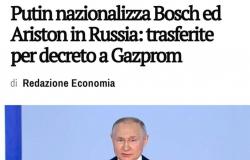
The president of the European Commission Ursula von der Leyen he announced during his State of the Union address last September the request to Mario Draghi to quickly prepare a “report on the future of European competitiveness”. Today Draghi anticipated some of its contents by speaking at an event on the European social pillar in La Hulpe, Belgium.
Draghi’s assumption is that the EU is designed and organized on the basis of a world that has changed and therefore a “radical” change is urgently needed in the Union too. “Our organization, decision-making and financing are designed for yesterday’s world, pre-Covid, pre-Ukraine, pre-middle east conflagration, pre-return of great power rivalry. We need a European Union that is worthy of the world of today and tomorrow what I propose in the report that the President of the Commission asked me to prepare is a radical change. Which is what is needed.”
“We have to achieve a transformation of the European economywe need to be able to do reliable on a decarbonized energy system reliable, one European integrated defenseone domestic production in the most innovative sectors it’s a leading position in manufacturing technology”.
The President of the European Commission, Ursula von der Leyen: “Enrico Letta and Mario Draghi, speaking at the same conference, said: “Enrico Letta and Mario Draghi spoke about the challenges for our competitiveness and the single market: their reports will show us the way for the future.” And he added ” Over the next five years we must confirm our Union’s primacy as a place to live and do business.”
In the afternoon, the press agencies “beat” the endorsement of Draghi as the next president of the EU Commission even by the Hungarian prime minister Victor Orban: “I don’t know, but I like Draghi. I respect him, he’s a good person.”
Draghi: “A European industrial strategy is missing. We must move forward in the Capital Markets Union”
“The majority of investments will have to be covered by private investments. Private savings are very high and they are mostly funneled into bank deposits and don’t end up financing growth as much as they could in a broader capital market. This is why moving forward in the Capital Markets Union is an indispensable part of the overall competitiveness strategy,” said the former Prime Minister.
“We have not had an industrial deal at European level, although the Commission is making every effort to fill this gap. Despite the positive initiatives underway, we still lack an overall strategy to respond to these strategies. We invest less than the United States and China in digital and advanced technologies, including defense. There are only four top European players among the top 50 global companies“, he explained. “We lack a strategy on how to protect our traditional industries from unequal competitiveness due to asymmetries in rules, subsidies and trade policies. Energy-intensive industries are a case study: in other regions these industries not only face lower energy prices but also less regulatory burden and in some cases receive massive subsidies that directly threaten the ability of European companies to compete. Without studied and coordinated political actions it is logical that some of our industries will shut down their capacities and relocate outside the EU“, highlighted the former prime minister.
For defence: “joint procurement” and “coordination”
“To meet new defense and security needs,” the EU must “intensify joint procurement, increase coordination of spending and interoperability of equipment, and substantially reduce international dependencies,” Draghi said. “In the defense sector, the lack of ‘economy of scale’ is hampering the development of Europe’s industrial capacity. The top five operators in the United States account for 80% of its largest market, while in Europe they account for 45%. This difference stems largely from the fact that EU defense spending is fragmented”.
The topic of energy supply and critical minerals
“We rightly have an ambitious climate agenda in Europe and tough targets for electric vehicles but in a world where our rivals control many of the resources we need, this agenda must be combined with a plan to secure our supply chainfrom critical minerals, to batteries, to charging infrastructure.”
“If we want to achieve our climate ambitions without increasing our dependence on countries we can no longer rely on, we need a global strategy that covers all stages of the critical mineral supply chain. We are currently largely leaving this space to private actors, while other governments directly lead or strongly coordinate the entire chain. We need a foreign economic policy that delivers the same outcome for our economy.”
“The Commission has already started this process with the Critical Raw Materials Act, but we need complementary measures to make our goals more tangible. For example, we could envisage a European platform dedicated to critical mineralsmainly for joint procurement, security of diversified supply, pooling, financing and warehousing,” he proposed.
The “dangerous obsession” of internal competitiveness
“For a long time, competitiveness has been a controversial issue for Europe. In 1994, the future Nobel Prize-winning economist Paul Krugman he called the focus on competitiveness a “dangerous obsession.” His thesis was that long-term growth comes from increased productivity, which benefits everyone, rather than from trying to improve one’s relative position relative to others and capture their share of growth. The approach taken to competitiveness in Europe after the sovereign debt crisis seemed to prove his point. We have pursued a deliberate strategy to reduce salary costs relative to each other and, combining this with pro-cyclical fiscal policy, the net effect has only been to weaken our domestic demand and undermine our social model. But the fundamental issue is not that competitiveness is a wrong concept. The fact is that Europe has had the wrong focus.”
“We have turned inward, seeing our competitors among ourselves, including in areas such as defense and energy where we have deep common interests. At the same time, we haven’t looked outward enough: With a positive trade balance, after all, we have not paid enough attention to our external competitiveness as a serious political issue,” he highlighted.
The subset of member states
“To ensure coherence between different policy instruments, we should be able to develop now a new strategic tool for the coordination of economic policies. And if we find that this is not feasible, in specific cases, we should be prepared to consider proceeding with a subset of Member States. For example, enhanced cooperation in the form of a 28th regime could be a way forward for the CMU to mobilize investment.”
The advantage of “rivals” acting as the “only country”
“Our rivals march ahead of us, with an advantage, because they can act as a single country, with a single strategy, and align all the necessary tools and policies behind it. If we want to match them, we will need a renewed partnership between Member States: a redefinition of our Union, no less ambitious than what the founding fathers did 70 years ago, with the creation of the European Coal and Steel Community”.
Tags: Draghi anticipates themes report Commission propose radical change





